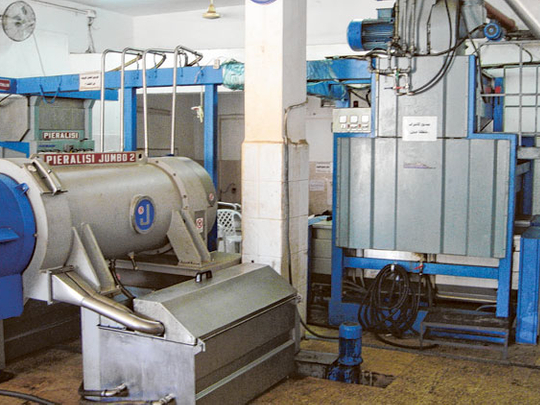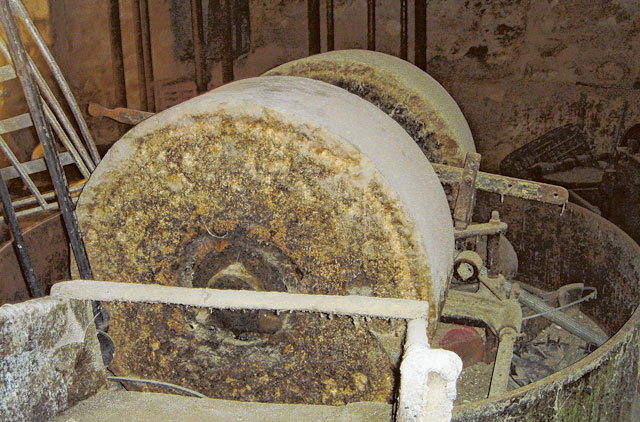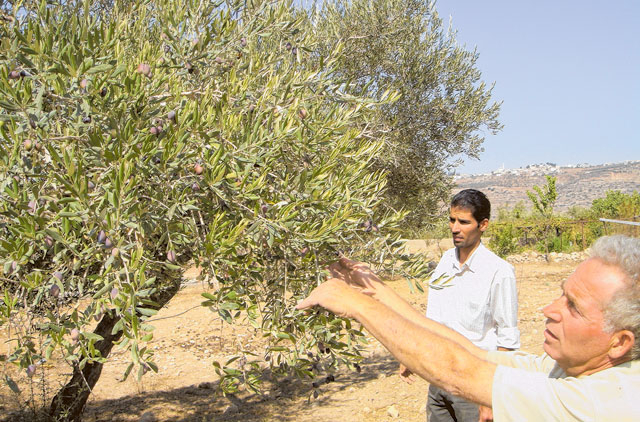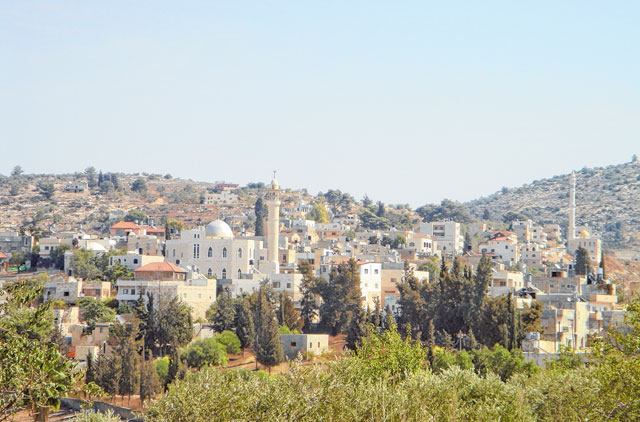
It is olive harvest time in Palestine. What historically has been a joyous and celebratory affair is nowadays marred by violence. Israeli colonists run amok and Palestinian farmers and their families suffer while the Israeli police and soldiers stand on the side of their own.
Palestine has large tracts of land devoted to the olive tree; about 45 per cent of agricultural land bears 12 million olive trees, most of them in the West Bank. Every harvesting season, the fruit of these olive trees is taking centre stage, becoming more than just a symbol of resistance in the political conflict between Palestinians and Israelis.
On the other hand, the Quran in 23:20 speaks of it as a bounty from God in the holy land, “as well as a tree that issues from [the lands adjoining] Mount Sinai, yielding oil and relish for all to eat”.
Cultivating olive trees and harvesting this murky, tangy and golden liquid is the livelihood for approximately 100,000 Palestinian families. Olive picking is more than just a seasonal chore — it is a way of life. Families tend to their olive trees all year round to harvest them in October and November. Family members, young and old, gather in the fields from early morning until sunset to pick the olives, collecting them in large nylon bags and then hauling them to the nearest olive press to extract the oil.
For the thousands of families who have harvested olives for generations, the land means little if it is not cultivated. They consider the olive tree a lifelong investment and it thus assumes a special meaning, with families even distributing inheritances of olive trees.
An olive seedling can take several decades to fully mature, and many of Palestine’s olive trees are hundreds of years old.
For Israel, the olive trees have become just another means in their campaign to ethnically cleanse Palestinians. The United Nations’ Office for the Coordination of Humanitarian Affairs in the Occupied Territories noted the hardships that the (separation) wall has caused for farmers: 44 out of 66 wall gates are only open during the harvest season, keeping Palestinian farmers off their lands for the rest of the year, thus impeding the regular maintenance of the olive groves and undermining their productivity; and 40 per cent of applications for “visitor permits” to access (Palestinian) olive groves on the other side of the wall were rejected and in some instances, only the farmer has been allowed to harvest his olives.
Volunteers from all over the world join in the planting of saplings in February and harvesting of the olives in October and November to show solidarity with the farmers. This has been a tremendous source of strength for Palestinians. Either by participating in the activities alongside Palestinian farmers or by buying Palestinian olives, olive oil and olive soap anywhere in the world, they contribute to the cause.
Hanan Ashrawi, a member of the Palestinian Liberation Organisation, has recently written to foreign envoys requesting that they place observers among Palestinians harvesting olives to deter colonist attacks.
“Given Israel’s support for the settlers [colonists] and its refusal to allow the Palestinian Authority to provide protection throughout the occupied territory, the Palestinian people require international intervention to ensure their security,” the letter reads.
Palestinian security forces are restricted to urban centres of the West Bank, designated “Area A” in the Oslo Accords, leaving most agricultural workers dependent on Israeli forces to thwart colonist attacks.
B’Tselem, an Israeli human rights organisation, has already documented five attacks on Palestinian farmers since the harvest began and has called on the army and police to investigate each incident. It has lodged complaints stating that the soldiers did not intervene to prevent those attacks.
Robert Serry, the UN’s special coordinator for the Middle East peace process, has called on Israel to protect the Palestinians during the olive harvest, which, UN staff on the ground report, has been beset by daily colonist attacks in its first few weeks.
Serry said he was “alarmed” at the repeated attacks on farmers and destruction of hundreds of olive trees, a crucial source of livelihood for Palestinians living in the West Bank.
“These acts are reprehensible and I call on the Government of Israel to bring those responsible to justice,” Serry said in a statement, adding, “Israel must live up to its commitments under international law to protect Palestinians and their property in the Occupied Territory so that the olive harvest — a crucial component of Palestinian livelihoods and the Palestinian economy — can proceed unhindered and in peace.”
The olive tree and its fruit has been so politicised and so much has been said and written about it that I decided to join a Palestinian family in this year’s olive harvest — to learn about the reality on the ground as the fruit from the tree makes it to the press and the oil is processed.
Yunus Yameen, a local agronomist who drove me to the village of Mazare Al Noubani, explains that besides the political issue related to the Israeli colonists, “climate change is also affecting the quantity and quality of the olive oil. Drought has an adverse effect on the taste of the extra virgin olive oil.” He adds, “Many international non-governmental organisations are supporting Palestinian farmers with best-practice actions, but all of that cannot change the climate and the lack of rain.”
The village is close to the city of Ramallah and not subject to colonist attacks as others generally are. Yameen chose this particular olive grove so that we may peacefully partake in and experience a typical Palestinian olive harvest. The olive trees that sit on terraced valleys make for a spectacular sight, with families gathered everywhere, busy, harvesting olives, adding the human element to a living visual portrait of the holy land.
We meet with Tayel Mesef, who could easily be mistaken for a German. He graduated as an engineer from Frankfurt, but eventually returned to his village to cultivate his land, which bears 300 olive trees and means so much to him and his family. His three daughters, all students at Birzeit University, and two sons, who help him on the farm, were busy picking the ripened olives: they drop them from the trees on to the ground and then gather them into plastic bags.
It seemed obvious that he was instilling in his children the same affinity he has for the olives and the land, and it was a pleasant sight to behold, father and children sharing in a labour of love.
Yameen points out in a tone of sadness and resignation: “The new generation is not motivated like the last. In the past, it was a celebration during the olive harvest but things are changing.”
Observing how Mesef and his family were enjoying picking olives and having a picnic afterwards, though, one couldn’t help but feel that hope may still be alive.
“The green olive, we use for pickles, but the ripened black olive is used for oil,” Mesef explains. “The harvest season is in October and November, but during the year we tend to the trees by ploughing and tilling the land.”
He adds, “We use everything: the old wood, we burn; the dry material after the pressing, we use for heating and as animal feed or compost.
The French are teaching Palestinians to make olive paste, which is something we did not do until now.”
Mesef walks to an olive tree that is “more than 2,000 years old” to show how stones are placed at the base of the exposed roots to “keep it alive”. He says he had to build a wall around his plot because “ancient Roman antiquities lie beneath, which locals tried to dig out and sell to the Israelis”.
Mesef belongs to a local cooperative, which means he and the neighbouring farmers pick olives and collectively press them. The cooperative then stores the oil and sells it on their behalf. Other farmers do it on an individual basis.
“About 80 per cent of my income comes from olives and the vegetables I grow on my land. I also teach German at the Institute of Languages in Ramallah. For other farmers, their main source of income is the olive and its oil,” Mesef says.
I met Dr Basem Taha, a Missouri-educated medical doctor, who now lives and practises in the West Bank. “I am here every harvest season to help my aged aunt with her olives,” he proudly says. “I enjoy it and nothing will stop me from being here every year.”
Once the olives are collected, donkeys carry them to the trucks parked nearby, which then take them to the press.
The olive presses now have modern Italian machines, a far cry from the ancient donkey-driven presses, which still exist in some places as a reminder of the old days.
The satisfaction of seeing the fruit of days of labour transformed into valuable oil, poured into and stored in plastic containers, makes olive cultivation a worthwhile experience for all those involved.
Olives and its oil have always been a way of life for Palestinians through periods of occupations by Romans, Crusaders, Turks, Jordanians, British and now Israelis. The tree symbolises steadfastness and resistance, so it will continue to feed and nurture a people always under occupation, helping them in their struggle against immeasurable odds.
Many farmers somehow feel that the colonists are just another passing political nuisance and they just have to hang on to their land with the faith of their ancestors.
Meanwhile, whenever I taste Palestinian olive oil, I will relive this experience.
Rafique Gangat, author of Ye Shall Bowl on Grass, is based in Occupied Jerusalem.
captions:
All pix by Rafique
154: Palestinian boy picking ripened Olives and dropping them on the plastic below
171: Tayel Mesef picking olives in foreground and Yunus Yameen helping in back
173: A Palestinian Village with the olives groves embracing the mountain
164: Mesef’s daughters helping with the olive picking
167: 2,000 year old Olive Tree
157: Ripened Olives destined for the Olive Press
185: Ancient Olive Press
182: Young Palestinian transporting olives on a donkey
189: Extra Virgin Olive Oil....the finished product
179: Palestinian Village of Mazare Al Nubani
192: Modern Olive Press





